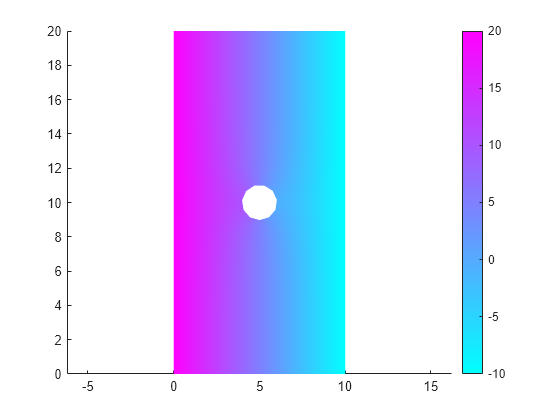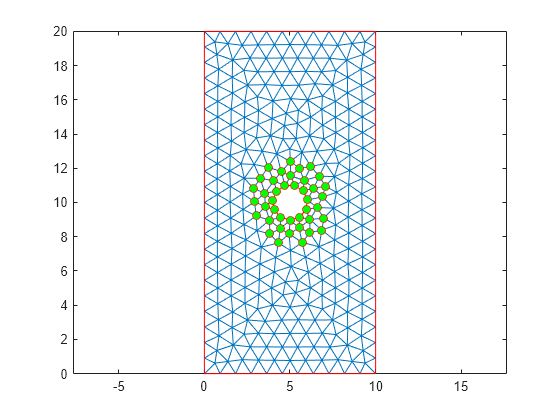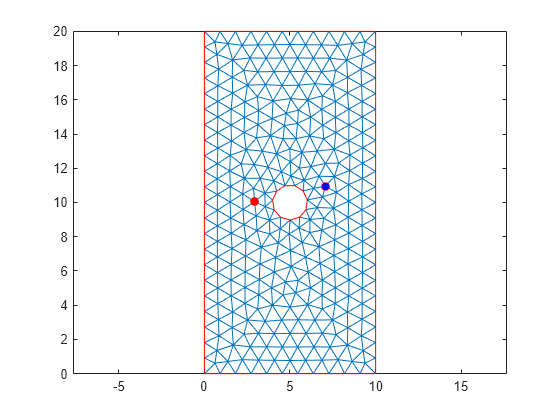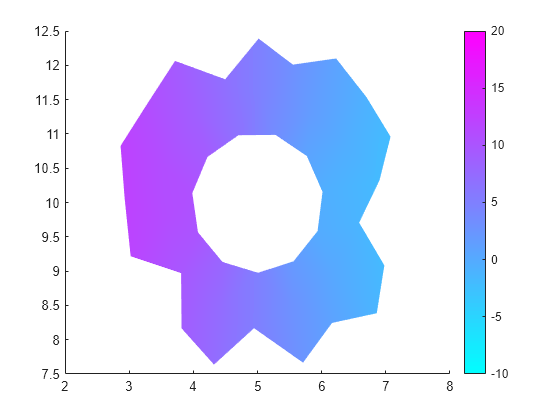Find Mesh Elements and Nodes by Location
Partial Differential Equation Toolbox™ allows you to find mesh elements and nodes by their geometric location or proximity to a particular point or node. This example works with a group of elements and nodes located within the specified bounding disk.
Create an femodel object for steady-state thermal analysis and include the geometry representing a plate with a hole in its center.
thermalmodel = femodel(AnalysisType="thermalSteady", ... Geometry="PlateHolePlanar.stl");
Plot the geometry.
pdegplot(thermalmodel,FaceLabels="on", ... EdgeLabels="on")

Assign the thermal conductivity of the material.
thermalmodel.MaterialProperties = ...
materialProperties(ThermalConductivity=1);Apply a constant temperature of to the left edge and a constant temperature of to the right edge. All other edges are insulated by default.
thermalmodel.EdgeBC(4) = edgeBC(Temperature=20); thermalmodel.EdgeBC(1) = edgeBC(Temperature=-10);
Generate a mesh and solve the problem. For this example, use a linear mesh to better see the nodes on the mesh plots. Additional nodes on a quadratic mesh make it difficult to see the plots in this example clearly.
thermalmodel = generateMesh(thermalmodel, ... GeometricOrder="linear"); thermalresults = solve(thermalmodel);
The solver finds the temperatures and temperature gradients at all nodal locations. Plot the temperatures.
pdeplot(thermalresults.Mesh,XYData=thermalresults.Temperature)
axis equal
Suppose you need to analyze the results around the center hole more closely. First, find the nodes and elements located next to the hole by using the findNodes and findElements functions. For example, find nodes and elements located within the radius of 2.5 from the center [5 10].
mesh = thermalmodel.Geometry.Mesh; Nr = findNodes(mesh,"radius",[5 10],2.5); Er = findElements(mesh,"radius",[5 10],2.5);
Highlight the nodes within this radius on the mesh plot using a green marker.
figure pdemesh(thermalmodel) hold on plot(mesh.Nodes(1,Nr),mesh.Nodes(2,Nr), ... "or",MarkerFaceColor="g")

Find the minimal and maximal temperatures within the specified radius.
[Temps_disk] = thermalresults.Temperature(Nr); [T_min,index_min] = min(Temps_disk); [T_max,index_max] = max(Temps_disk); T_min
T_min = -2.1073
T_max
T_max = 12.3205
Find the IDs of the nodes corresponding to the minimal and maximal temperatures. Plot these nodes on the mesh plot.
nodeIDmin = Nr(index_min); nodeIDmax = Nr(index_max); figure pdemesh(thermalmodel) hold on plot(mesh.Nodes(1,nodeIDmin), ... mesh.Nodes(2,nodeIDmin), ... "or",MarkerFaceColor="b") plot(mesh.Nodes(1,nodeIDmax), ... mesh.Nodes(2,nodeIDmax), ... "or",MarkerFaceColor="r")

Now highlight the elements within the specified radius on the mesh plot using a green marker.
figure pdemesh(thermalmodel) hold on pdemesh(mesh.Nodes,mesh.Elements(:,Er), ... EdgeColor="green")

Show the solution for only these elements.
figure
pdeplot(mesh.Nodes,mesh.Elements(:,Er), ...
XYData=thermalresults.Temperature)